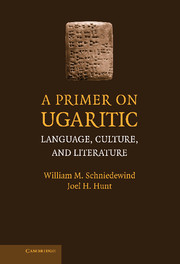3 - Letters (KTU 2)
An Inductive Introduction to Ugaritic
Published online by Cambridge University Press: 05 June 2012
Summary
INTRODUCTION TO LETTERS
Letter writing throughout the Fertile Crescent, as in all cultures, was formulaic. The origins of these formulas lie in oral messages transmitted via intermediaries. An intermediary, who carried the missive from sender to recipient as a document of authorization, was allowed to expand the content should the recipient request any explanatory information. Depending upon the culture, this agent would be called mār šipri (Akkadian), wpwty (Egyptian), or mlʾak (Ugaritic; compare with the Hebrew ךאלמ). Scribes in Ugarit and other Eastern Mediterranean sites inherited and adapted the conventions of correspondence developed over centuries in Mesopotamia. Terms like “lord” and the metaphorical use of kinship terminology like “father,” “mother,” and “brother” indicated the relative social status of the correspondents. One notices a predictable obsequiousness on the part of a person requesting help from a superior. These and other features reflect the absorption of the long tradition of cuneiform letter writing by scribes who composed correspondence in Syria and Palestine. The Ugaritian scribes, who were trained in multiple languages, drew heavily upon Akkadian epistolary phraseology to write letters in their own language.
To assist you in seeing the similarities in the formulaic nature of the Akkadian syllabic and the Ugaritic alphabetic letters, we have placed this Akkadian letter alongside a Ugaritic letter in Figure 3.2. Since the Ugaritian scribes wrote in both languages, the forms of the dominant Akkadian epistolary style no doubt helped shaped the Ugaritic style.
- Type
- Chapter
- Information
- A Primer on UgariticLanguage, Culture and Literature, pp. 40 - 91Publisher: Cambridge University PressPrint publication year: 2007



